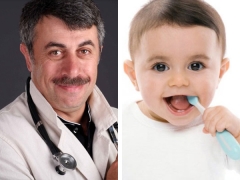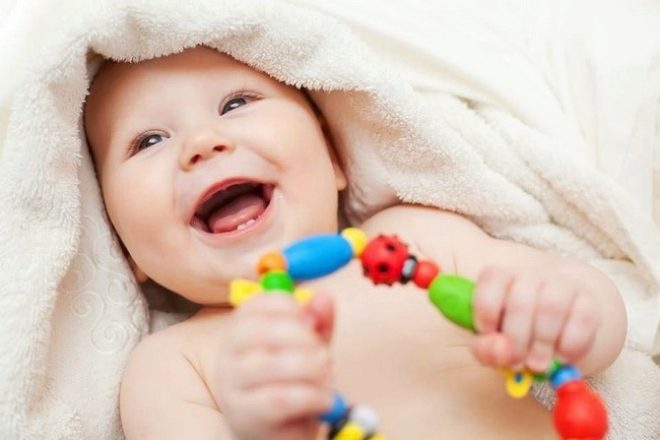Dr. Komarovsky about teeth in children
The first tooth of a child may erupt easily or with pain, but it is always a joyful event in the family. True, new worries also come with him - parents care about whether other milk teeth erupt from their offspring by age, do they grow correctly, and why do they sometimes get dark? We collected in one article the answers of the authoritative doctor Evgeny Komarovsky to the most common parental questions about children's teeth. Most of this information was included in the doctor’s articles, in his video tutorials.
When do teeth start cutting?
The timing of the appearance of the first teeth in a child is strictly individual, emphasizes Yevgeny Komarovsky. There are some averaged norms, but deviation from them is not considered a pathology. The first teeth, according to generally accepted medical standards, are cut in 6-7 months. This process can drag on for up to 2.5 years.
The first usually appear two lower incisors - the two upper incisors. Then the upper and lower lateral incisors appear. The first molars appear by the year, fangs - in a year and a half. The second indigenous - in 2 years.
The vast majority of two-year-olds already have 20 teeth in their mouths.
The timing of cutting the first teeth, what to give the child to gnaw, than to smear gums - Dr. Komarovsky will tell in the next video.
Many parents, according to Komarovsky, are worried because of the late eruption. Panicking yourself and not worth it, says the doctor. Teeth is a very individual process, someone can get out of the first cutter at 4 months, and at 8 months there is not one. The order of eruption also may differ significantly from the existing general standards, and in this, according to Komarovsky, there is no pathology.
What medicines can stimulate eruption?
Such medicines and folk remedies do not exist. Teeth is a genetically determined factor, and therefore it is impossible to speed up or slow it down. Everything happens when the time comes for that particular child. Medicine today can not affect it. And because parents do not have to worry if, for example, a child in 9-10 months does not have a single tooth. If at the same time he has no kidney diseases, problems with metabolism, then this is also a variant of the norm. Nothing to stimulate is necessary.
How to relieve symptoms?
In some babies, the symptoms of the upcoming first tooth appear long before the eruption itself, while others do not appear at all. The most frequent "satellites" of this process are fever, diarrhea during eruption, excessive salivation, painful swelling and redness in the gum area, which gives the baby a lot of suffering.
Komarovsky does not think that it is necessary to purposefully help with medicines every baby who has teeth cut. However, it’s not worthwhile to refuse the crumbs of help, provided that the baby feels very bad.
Evgeny Olegovich recommends to beat down high temperature with Paracetamol Detsky. The doctor reminds that this remedy will not only help reduce the fever, but will also be able to numb the gums; the child will feel much better for a while.
Increased drooling is more associated with hormonal processes in the child’s body than directly with the appearance of teeth. Therefore, neither parents nor doctors can affect the amount of saliva. Komarovsky emphasizes that often saliva appears long before the first tooth, a month at 3, but time passes and teeth do not appear.
Loose stools, which also sometimes happen during the appearance of teeth, do not need special treatment, because it is usually short-term, not tight. One-two-three episodes of diarrhea - and the tooth has already erupted.
However, if diarrhea is intense, frequent and lasts for more than two days, you need to consult a doctor to find its true cause. It is likely that the teeth have nothing to do with it.
What to do with itching in the gums is clear even to inexperienced parents. There are teethers - special rings and toys, which are made from quality materials, with a burghist structure. Such a toy, taken by the child in the mouth, will immediately significantly ease his condition, since the child will be able to scratch what itches.
Without unnecessary need, you should not use dental gels and ointments for gums.
Vivid symptoms inherent in the process of teething, which is less common than manufacturers of gels and oral sprays represent. Many mothers generally notice the first tooth only when it has already been cut and begins to interfere with breastfeeding.
How to feed a child whose teeth are cut?
Often, mothers note a decrease in the appetite of the baby during the eruption of the first incisors. Everything is simple, says Komarovsky, sucking gives some discomfort, so the baby refuses to suck. But even in this situation it is not necessary to feed the toddler by force, it will not bring benefit.
Yevgeny Komarovsky believes that nothing terrible will happen if the baby misses 2-3 feedings. A hungry baby who can no longer tolerate will take a breast or a bottle when he becomes very hungry, and will surely eat.
What happens to immunity when teething?
Of course, this process has a direct impact on the children's body. Saliva is produced a lot, but it is almost devoid of important protective properties, due to this, the immune system is somewhat weakened. Therefore, it may well be possible to join ARVI or the flu to all the “joys” of the first teeth, and then the one-year-old “sufferer” will be quite difficult.
The risks of infection with viral infections will be minimized provided that the child lives in favorable conditions and the parents do not overdry the air in the nursery, do not overheat it, and closely monitor the humidity and temperature. The standards are as follows - the temperature is from 18 to 20 degrees, the humidity of the air is from 50 to 70%.
What if baby teeth turn black?
Many parents, with someone's easy feed, support the rather strange view that milk teeth become black and dark due to children's intestinal dysbiosis. Black plaque can appear, according to Komarovsky, only for two groups of reasons:
- Metabolic disorders, and, first of all, phosphorus, calcium and vitamin d.
- A number of other reasons may be associated with insufficient saliva function. If a baby breathes too dry air, its saliva dries out and cannot effectively resist bacteria entering the oral cavity. Hence the dark bloom on teeth.
Dysbacteriosis is in no way related to the state of the child’s teeth, Komarovsky emphasizes. If the teeth darken, you should not feed the child with probiotics, but lead to a good pediatric dentist, so that he prescribes adequate treatment for the situation.
Why does a child “gnash” his teeth at night?
Most parents believe that teeth grinding in a dream is a clear sign of helminthiasis in a baby. Komarovsky does not undertake to dispute this statement, although he stresses that so far the medicine has failed to prove whether the connection between the tooth gnash and worms. In other words, the worms are found in the creaking teeth of babies, and those who do not.
The exact cause of dental squeak at night is unknown, but all doctors, including Komarovsky, agree that it is not a disease, but a condition that tends to pass without a trace on its own. There is a theory that this is a manifestation of the residual animal reflex, with which the four-legged and toothy sharpen their teeth. But this too is not proven by science.
The night gnashing of teeth is usually associated with two unpleasant moments, Komarovsky says:
- To listen to this sound, few people have enough nerves, since the creaking of teeth is in the leading positions of the list of the most difficult to bear sound stimuli.
- When squeaking with the jaws, the child can damage the teeth themselves. Chipping, cracks may occur, and this will require treatment by a dentist.
When should I start cleaning baby teeth?
Evgeny Komarovsky always answers this question in the same way - from 1.5-2 years.
If the pussy already understands the word “must,” you can explain to him why and how we brush our teeth. If you still do not understand, you need to show their adult example.
Children tend to imitate, and therefore in most cases there are no problems with schooling to proper care. Many parents stop the fact that the baby does not know how to rinse your mouth and spit out the water. Let him swallow, says Komarovsky, if he likes it that way. But for such a child should not buy children's toothpastes, and the usual tooth powder, rich in calcium. And let him swallow it for health.
However, Yevgeny Komarovsky warns moms and dads against too early accustoming to brushing their teeth with toothpastes, even with children, and even those who have the cherished word “Hypoallergenic” on their tubes. The microflora of the oral cavity up to two years is better not to break, the famous pediatrician believes, and from allergies no one is insured.
Is it necessary to treat milk teeth?
Yevgeny Komarovsky says that it is necessary to do this. If the child has problems with the state of the teeth, then one removal will not be enough. If the child prematurely loses milk teeth, then it can negatively say on the bite. And then the permanent teeth of this problem will not solve.
Any inflammatory process in the oral cavity is quite dangerous for the entire child's body, because from the mouth of the pathogenic bacteria easily penetrate into the esophagus, and in the stomach, and anywhere. This is another good reason for reasonable parents to treat milk teeth.
Modern treatment is not like the treatment of twenty years ago. It is not painful, almost not painful. In addition, medicine offers all new and new methods to preserve the health of children's teeth - silvering for children, in whom caries spreads quite quickly, the fluoridation of teeth.
These methods, says Komarovsky, can be treated well and badly, but they are there, and if there are problems, the dentist will surely announce the entire list of procedures that a child can do. The decision will be only for parents.
How to maintain health in adverse regions?
There are places on the map of Russia where dentists always have a lot of work. This is mainly due to the quality and composition of drinking water. For example, in Primorye, teeth go to treat from early childhood due to the fact that there is a catastrophic lack of fluoride in water. And in some areas of the Moscow region in the water too much iron, it also significantly affects the health of teeth.
Parents from regions with a deficiency of fluorine (the most common situation) Komarovsky advises necessarily introduce fish broth in the diet of children. You can cook soup on it and give it at least twice a week.
Twice a year, in spring and autumn, Evgeny Olegovich recommends giving the child vitamin-mineral complexes that contain fluoride.




























